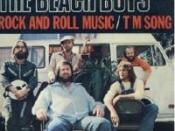Rock and Roll Music: Censored? Thesis: Although both authors support their views, the author of :Should Rock be Censored" successfully completes her mission in supporting her belief that Rock and Roll music should be labeled, giving people a choice the music they are exposed to. While some people feel that explicit music should be labeled by entertainment producers, others do not see the point.
I. Introduction A. Lead In B. Thesis II. Summary and Logic of Tipper Gore's article A. Summary Points 1. Dangers posed on children 2. Label (Censor) Material B. Logic 1. Excessive violence 2. Monitor active interest of children III. Summary and Logic of Anna Quindlen's article A. Summary Points 1. Raised on Rock-and-Roll 2. Dance to it Wall ii B. Logic 1. Feeling of music 2. Over-analyze IV. Conclusion A. Restate thesis B. Clincher Rock and Roll Music: Censored? Rock-and-Roll music today has been said to have a negative effect on today's youth.
The debate over this topic is the negative effects it places on our children causes reasons for it to be censored. However, others claim that analyzing the music too much takes the feeling away from it. Most people tend to just go with the flow of the music and not the lyric it self. Although both authors support their views, the author of :Should Rock be Censored" successfully completes her mission in supporting her belief that Rock and Roll music should be labeled, giving people a choice the music they are exposed to. While some people feel that explicit music should be labeled by entertainment producers, others do not see the point.
Tipper Gore expresses her concern about violence and sexuality in rock music. She claims our youth are suffering from the impact the music has on their actions. "This music celebrates gruesome violence and explicit messages that sadomasochism is the essence of sex" (Gore 51). According to Gore, this graphic violence is especially damaging for young children because "they lack the moral judgement of adults"(Gore 51). "Children are not aware of the consequences of their actions" (Gore 51). They initiate the acts they see on television and hear in songs, not fully understanding or being aware of what outcome may arise from their behavior.
Labeling these music and television products will at least be a step in which the people will know what they are buying and therefore will be able to choose what they see and hear. "Entertainment producers must take the first step, by labeling sexually explicit music" (Gore 50).
Anna Quindlen gives reasons why labeling Rock-and-Roll music has no point. She says, " the music is a part of life, you just grow up with it" (Quindlen 56).. To critique the music, or break it down, lyric by lyric takes away the feeling of it. The music is not necessarily understood, but is appreciated because of the feeling perceived from it. According to Quindlen, "rock and roll is a lot like sex: If you talk seriously about it, it takes the feeling away- and the feeling is the point." Some people over analyze rock and roll music just as the over analyze everything else (Quindlen 56). If the music was just there without all the issues that arise from analyzing it, there would be no need for labeling. Then is when people will be able to feel the music other than what the point of the song is or what is to be understood about it.
In conclusion, Gore argues her issue well, but Quindlen's view is more bias than considerate. Gore is successful in explaining her issue on why sexually explicit material should be labeled. It allows for parents to choose what their children encounter. Therefore, positively influencing the culture that shapes their lives. Quindlen's point on labeling these materials have no point and is mainly a self interest point of view. She tends to focus on what she gets out of it rather that the effect one may get from analyzing it and taking it to heart. Everyone may not feel the music the same as she does. Therefore, to label music, one would at least have some incite and choice on what to expect from it. What the person gets out of the music and how well he/she interprets it, depends on how well they are able to judge the situation.





